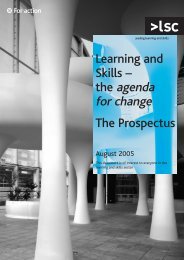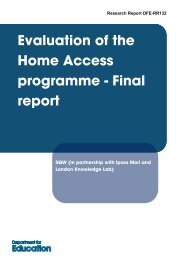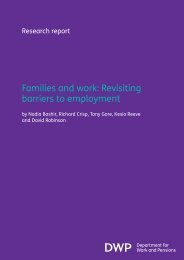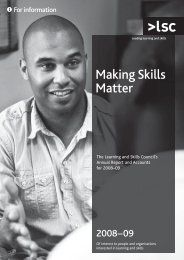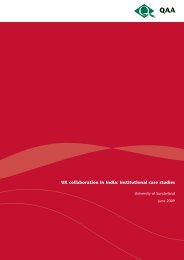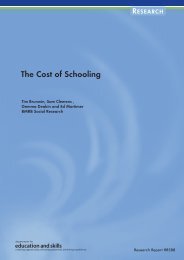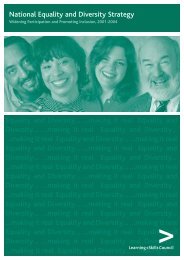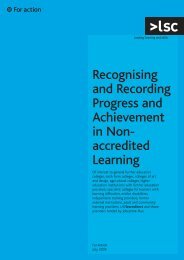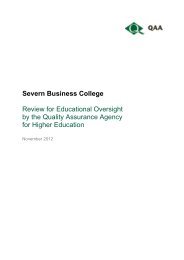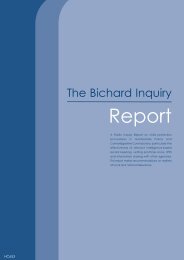Faiths and further education - Church of England
Faiths and further education - Church of England
Faiths and further education - Church of England
- No tags were found...
Create successful ePaper yourself
Turn your PDF publications into a flip-book with our unique Google optimized e-Paper software.
29Festivals89Important religious festivals <strong>of</strong> all faiths can be marked withservices or some other form <strong>of</strong> college event or display. Moststudents in multi-cultural areas will be familiar with key festivalssuch as Diwali, Eid <strong>and</strong> Yom Kippur, in addition to students fromthose particular faiths.And even the most secular individuals havebeen known to turn up for the carol service.Fair Trade stall <strong>and</strong> displays90Many chaplains have found that a Fair Trade stall is an effective way<strong>of</strong> educating people about values <strong>and</strong> their relevance in supposedlynon-religious or non-spiritual areas.The stall can also be a goodway <strong>of</strong> making contact with a large number <strong>of</strong> students. Displays inconnection with various annual events, for example,World AIDSDay, Christian Aid Week, Racial Justice Sunday <strong>and</strong> so on, arecommon in most chaplaincies. Most colleges will agree to a displayin the reception area, cafeteria <strong>and</strong> so on.Also important aredisplays <strong>and</strong> arts <strong>and</strong> cultural events, or events designed to raisemoney for a fund set up for a particular event, such as the TsunamiRelief Fund, or for a disaster or famine appeal.“An art exhibition <strong>of</strong> student’s work on HIV/AIDSprevention, organised by the chaplaincy incollaboration with a college in Ug<strong>and</strong>a, gained majorpublicity for the college in local press, radio <strong>and</strong> TV.”(FE adviser)Curriculum91Chaplaincy involvement in the curriculum is important <strong>and</strong>chaplains are encouraged in most colleges to find ways <strong>of</strong>contributing through a presence in the classroom (for example,teaching or contributing to religious <strong>education</strong>, science <strong>and</strong> ethics).Some posts are formally split, with a proportion <strong>of</strong> the chaplain’stime given to teaching in a subject area where the chaplain hasexpertise. In other cases, chaplains provide input to courses on aregular or one-<strong>of</strong>f basis.The colleges also need tutors to provideenrichment activities.Enrichment92In both sixth form colleges <strong>and</strong> general FE colleges, the introduction<strong>of</strong> Curriculum 2000 included an entitlement to the development <strong>of</strong>key skills, tutorials <strong>and</strong> enrichment activities for all full-time16–18-year-old students starting programme from the 2000/01teaching year onwards.The LSC expects that the entitlement willinclude regular tutorials, <strong>and</strong> relevant key skills teaching <strong>and</strong>enrichment activities, delivered within an appropriate number <strong>of</strong>guided learning hours (glh), in addition to the other learning aimswithin the learner’s programme. Consideration <strong>of</strong> the entitlementprovision delivered by colleges <strong>and</strong> providers is reviewed duringinspection. Funding may be claimed for the key skills, tutorial <strong>and</strong>enrichment entitlement in each year <strong>of</strong> study.93Some examples <strong>of</strong> appropriate enrichment activities are:• learning aims that lead to external certificates <strong>of</strong> non DfESapprovedattainment, for example, Open College Network (OCN)provision, wider key skills,Young Enterprise, Duke <strong>of</strong> Edinburghawards <strong>and</strong> so on• collaborative activities with faith communities• spiritual <strong>and</strong> ethical issues• health, social <strong>and</strong> personal <strong>education</strong>• careers guidance• sports, music, dance <strong>and</strong> drama• industry-related programmes, including IT courses• guided or informal learning for example in the use <strong>of</strong> the learningresource centre.94According to the interviewed chaplains, popular enrichmentactivities with the students include:• quizzes, games <strong>and</strong> puzzles• sessions about looking after yourself, for example on health, diet,food, emotions or anger management <strong>and</strong> work–life balance• videos <strong>and</strong> interactive computer games• trips <strong>and</strong> visits.“Much <strong>of</strong> my work is meeting with students – I haveteaching experience, <strong>and</strong> I am invited into all kinds <strong>of</strong>classrooms to give one-<strong>of</strong>f or longer inputs into courses– for adults as well as 16–19 year olds.” (Chaplain)



